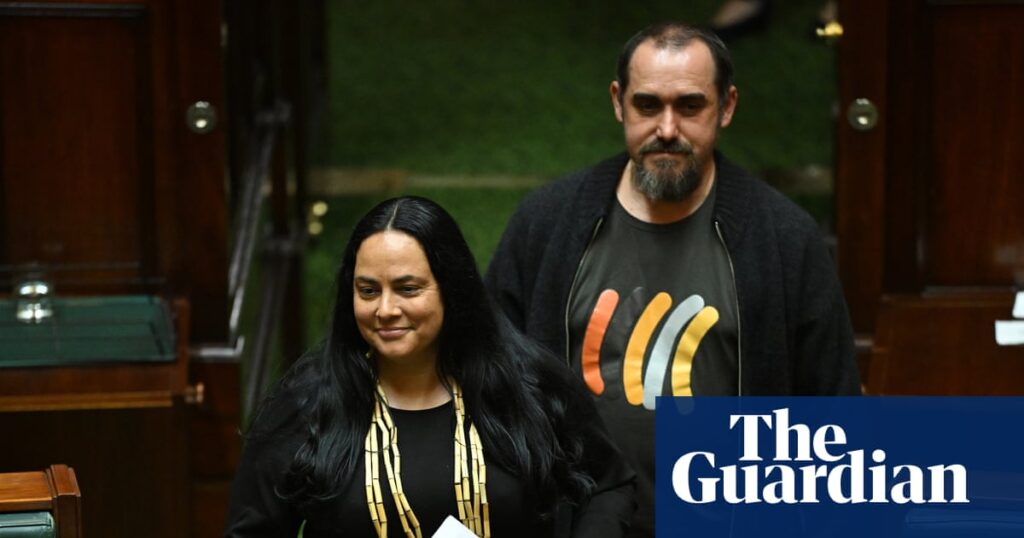
The Australian state of Victoria has taken a historic step towards reconciliation, passing the nation’s first formal treaty with Indigenous traditional owners. After two days of intense debate, the upper house of Victoria’s parliament approved the statewide treaty bill without amendment by 21 votes to 16, just before 9pm on Thursday.
As the vote was confirmed, Aboriginal and Torres Strait Islander flags were unfurled from the public gallery. The First Peoples’ Assembly co-chairs, Ngarra Murray and Rueben Berg, sat alongside fellow members and Aboriginal elders, witnessing the culmination of years of advocacy. The Labor, Greens, Legalise Cannabis, and Animal Justice party MPs who supported the bill turned to applaud the gallery.
“This is a historic moment for our people,” Ngarra Murray stated following the vote. “We will tell our children about today, and they will tell their children, passing down to future generations the story of how decades of Aboriginal resilience and activism led to Australia’s first treaty.”
Significance of the Treaty
The treaty marks the beginning of a new era, one where First Peoples’ 60,000 years of knowledge and culture are respected and celebrated. It provides an opportunity for all Victorians to acknowledge a shared history, heal, and move forward together. Rueben Berg emphasized that the treaty recognizes Aboriginal people as the experts on their own lives.
“Through treaty, we will have the ability to use our expertise to come up with and deliver practical solutions for our local communities, in areas like health, education, housing, and justice,” Berg said. “This will mean better outcomes for our people as we know what does and doesn’t work for us.”
The Victorian Premier, Jacinta Allan, highlighted that the treaty is the culmination of nearly a decade of work by the state Labor government, which began in 2016, and decades of advocacy from First Nations people.
Structure and Responsibilities
The legislation establishes the First Peoples’ Assembly as a permanent representative body to advise the government, under a new statutory corporation called Gellung Warl. In its expanded role, the assembly will be able to make representations, provide advice to the government, and question ministers. Ministers and government departments, in turn, will be required to consult the assembly on laws and policies related to First Peoples. However, the assembly will not have veto powers.
Gellung Warl will also include a truth-telling body, to be known as Nyerna Yoorrook Telkuna, and an accountability body, known as Nginma Ngainga Wara. The latter will ensure the government upholds its commitments under the national agreement on closing the gap. Other responsibilities include confirming Aboriginal identity, managing community infrastructure and cultural programs, and establishing an education institute for Indigenous leadership and skills training.
Next Steps and Broader Implications
With the bill now passed, the government and assembly will formally sign the 34-page treaty agreement, which includes a commitment to reshape the school curriculum to include truth-telling, a formal apology to First Peoples in parliament, and greater use of traditional placenames across Victoria. A public celebration will then be held in Melbourne.
This move makes Victoria the first Australian state to adopt Voice, Treaty, and Truth—the three pillars of reform set out in the 2017 Uluru Statement from the Heart, a landmark document created by Indigenous leaders calling for constitutional recognition. The treaty process originally enjoyed bipartisan backing, but the Liberal-National Coalition, the state’s centre-right opposition, withdrew its support after the failure of the 2023 national referendum that sought to enshrine an Indigenous voice to parliament in the constitution, in which about 60% of Australians voted “no.”
The announcement comes as a significant milestone in Australia’s journey towards reconciliation, setting a precedent for other states and territories to follow. The treaty offers a framework for addressing historical injustices and building a more inclusive future. As Victoria leads the way, the implications of this treaty will likely resonate across the nation, encouraging further dialogue and action towards Indigenous rights and recognition.





